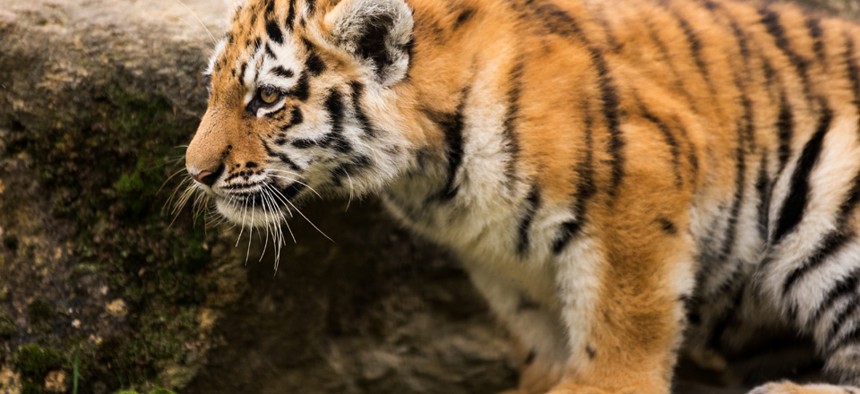
davemhuntphotography/Shutterstock.com
Hollywood, the Circus, and Congress Are Fighting Over 'Tiger Selfies'
Activists want Congress to stop the mega-feline selfie craze, and some members are signing on to help.
Social media has created a monster.
People are posing with tigers, lions, cheetahs, and jaguars, then uploading the images to Facebook and dating sites like OkCupid. So-called "tiger selfies" have proven paricularly popular with young men hoping to stand out from the crowd.
And the pictures are spreading like wildfire across social networks.
But animal-rights activists say the fad needs to end. The Humane Society claims big cats are mistreated when people keep them as pets or put the animals on display at roadside exhibits or county fairs where photo ops occur. Cubs are often separated from their mothers at a young age, kept in cages that barely contain them, and frequently not given the proper care.
"The appeal of a cuddly little tiger cub is obvious," said Carson Barylak, the campaigns officer for the International Fund for Animal Welfare. "But this is not right, and it needs to stop."
Activists want Congress to stop the mega-feline selfie craze, and some members are signing on to help. Lawmakers on Capitol Hill introduced the Big Cats and Public Safety Protection Act with bipartisan backing in the House and Senate last year. The legislation bars private ownership and breeding of big cats. And while the act wasn't written specifically with tiger selfies in mind, animal-welfare organizations say it would eliminate the opportunity for people to pose with outsized pets, at least in the United States.
Under the law, only zoos accredited by the Association of Zoos and Aquariums and sanctuaries would be authorized to keep exotic cats in captivity, with minor exceptions—and these venues don't allow visitors close contact with the animals.
Not many people defend the amatuer captivity of a big cat in order to spruce up a dating profile, but that doesn't mean everyone is on board with the legislation: Movie producers and animal breeders who work with the circus have fought the proposed ban, saying that it would hurt more-responsible animal owners.
Feld Entertainment, the company that owns Ringling Brothers and Barnum and Bailey Circus, has lobbied hard against the bill. The greatest show on earth doesn't like the Big Cats Act because it would put breeders that supply the circus with a steady stream of big cats out of business.
The Motion Picture Association of America also opposes the ban, and the association has also registered to lobby on the legislation. In sunny California, film studios pay exhibitors to shepherd lions, tigers, and other cats onto the set when movie scripts call for an exotic animal. But private exhibitors would be barred from handling massive felines if the proposed ban ends up on the books.
"The legislation would have unintended effects on the motion-picture and television industry," warned the trade association for major Hollywood production studios—including Paramount Pictures, Warner Brothers, and Universal Studios—in a statement. "Film and television producers would be forced to film outside the United States when big cats are required, taking American jobs with them."
Despite pushback, supporters of the measure have pressed on.
Animal advocates say the law serves as a needed antidote to a patchwork of existing state regulations that fail to adequately protect exotic pets. Some states have made it illegal for people to keep big cats as pets or display them outside of an accredited zoo. But loopholes often make it possible to get a permit for exotic cat ownership with little oversight. Meanwhile, anyone can purchase a big cat—without restrictions—in states like Alabama, Nevada, North Carolina, West Virginia, and Wisconsin.
Activists fear that social media creates added incentive for these pet owners to trot out tiger cubs as a way to make a quick buck. (Tiger selfies have become so widespread that the practice has spawned parody websites like Tinder Guys With Tigers showcasing feline photos pulled from the dating app.)
"Now that you can share photos with thousands of your friends on Facebook, people have started looking for ways to one-up each other," Carole Baskin, the founder and CEO of Big Cat Rescue, said. "What could be more eye-catching and outrageous than posing with a dangerous predator?"
Don't expect tiger selfies to disappear anytime soon. Even if the bill passes, people seeking a photo with a wild cat could go abroad to get their fix. And private pet owners in the U.S. would be allowed to keep their cats despite the fact that they would be prevented from purchasing any new animals. The reason? There's simply nowhere to put all the exotic cats currently in captivity.
The International Fund for Animal Welfare estimates that more than 10,000 big cats are kept as pets or privately owned in the U.S. Activists also report that 5,000 tigers are kept in captivity across the country, roughly double the number that live in the wild worldwide.
While it wouldn't change the math on exotic pets overnight, the Big Cats Act would weed out private ownership over time. That, supporters say, is a worthy goal. "These are wild animals whether they are in people's homes, shopping malls, or zoos," said Sen. Richard Blumenthal of Connecticut, a Democrat and sponsor of the Senate version of the bill. "The only safe way to see and experience them is in a place where there is protection."
(Image via davemhuntphotography/Shutterstock.com)







